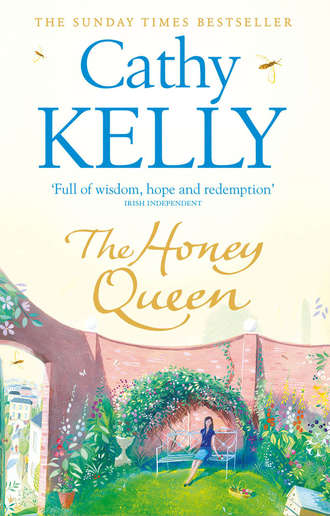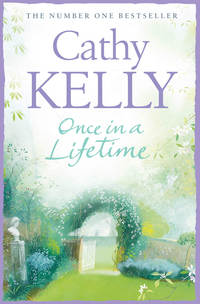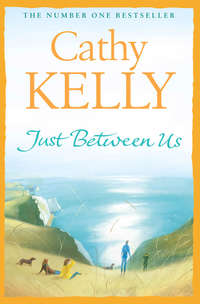
Полная версия
The Honey Queen
Peggy had smiled at her. ‘I’ve been planning this for a long, long time,’ she said.
But in spite of all the activity over paint, wood finishes and what shape to have on the cast-iron sign that hung at a right angle to the door, what Peggy hadn’t expected was to fall quite so much in love with Redstone itself.
She loved the small-town feel of it all, though it was nicer than any of the many towns she’d lived in through her life.
She loved the way people greeted each other cheerily.
‘How’s the leg, Mick?’ one man had yelled at another at the crossroads one morning as Peggy made her way to the shop.
‘Ah, you know,’ replied a tall elderly man with a stick and a small dog bouncing at the end of a lead. ‘Not up to line dancing yet, but some day. Did you ever get that thing sorted out?’
‘No,’ said the first man solemnly, adjusting his briefcase so he was holding it under the other arm. ‘It’s the timing, isn’t it? Still, I might yet!’
The lights changed and the man with the dog limped off in the direction of the small shopping centre tucked snugly away behind Main Street.
What was the thing, Peggy wanted to know. Why wasn’t it sorted yet? She had to control herself not to run and ask Briefcase Man, who was crossing the road and heading off in the opposite direction.
What was this madness that possessed her? Wanting to know about people? It was unlike her. She’d spent her entire life avoiding getting to know anyone. That way, they didn’t want to know you. Peggy was the girl who’d live in a town for a year, blending into the background as far as possible, remaining on the fringes of everyone’s lives. She’d spent too long as a solitary child to learn the gift of easy friendship as an adult. After a while, when she’d had enough, she would simply pack up her belongings and drive away. She had never allowed herself to put down roots. But for some reason here in Redstone she had an urge to belong, and belonging meant meeting people.
Because she was nice and early, there was plenty of parking outside the shop. She felt her spirits lift as they did every time her old blue Beetle shuddered to a halt at the kerb and she looked up to see the old-fashioned swing sign that read Peggy’s Busy Bee Knitting and Stitching Shop.
Nobody looking at this modest establishment with its fresh lavender paintwork and unfinished inside could imagine the sheer joy it already brought to its owner. It was still something of a miracle to Peggy. The miracle had involved years of hard work, hard saving and loneliness as she’d gone from job to job, getting experience in wool shops when she could, doing accountancy courses at night so she’d know how to run her own business, and working in bars or restaurants when she could get nothing else.
Now, she felt that all the sacrifices had been worth it. She, Peggy Barry, who had never been on any school’s most-likely-to-succeed list, had finally found exactly what she’d wanted all her life: a business doing what she loved best and financial independence. She was her own boss and she would never answer again to any man.
The money from her grandmother’s will – a grandmother she’d never even met – had been a godsend. The day the cheque arrived she had banked it in a high-interest account and then left it there, watching it grow year by year. Without that, she wouldn’t have been able to open her own shop.
Surveying her empire as she got out of the car, Peggy ran through the sums in her head. It would take only one or two more days at the most for Gunther, the carpenter, and Paolo, his apprentice, to finish. She’d considered several quotes before giving the job to Gunther. His had not been the cheapest, but he’d been the most professional of the carpenters she’d talked to, and he hadn’t given her a flirty grin, the way the young guy with the lowest price had.
As soon as the woodwork was finished, Peggy mused, she would clean all the dust from the shop and start painting the walls the same lavender as the outside—
‘How’rya, Peggy,’ yelled Sue from the bakery across the road as Peggy put her key in the shop door.
‘Hello, Sue!’ she called back.
Sue and her husband, Zeke, were always in at five in the morning. By the time Peggy arrived at half past seven, they were already halfway through their day’s work, baking organic breads and muffins to be delivered to shops and office canteens around the city.
Peggy enjoyed talking to them about the difficulties of setting up your own shop. And they’d been so helpful.
‘Advertise in the Oaklands News, don’t bother with the Redstone People. They charge twice as much and will mess up your advertisement every time,’ Sue advised. ‘Our ad for “hand-crafted cakes” turned into “dead-crafted cakes”. There wasn’t exactly a rush for them after that.’
‘What’s your web presence like?’ said Zeke.
‘A bit basic, but I’m working on it.’
‘Good. In the meantime, stick up your cards everywhere,’ he added, admiring the lavender-coloured notecards Peggy had commissioned with the shop’s name and pen-and-ink illustrations of wool and fabrics along with the shop’s address and fledgling website. ‘Be shameless. Ask everyone who has a noticeboard if you can put one up. Introduce yourself everywhere, even if you’re shy.’
Peggy had blushed to the roots of her dark hair. She’d spent a few days casting glances over at the bakery before Sue had marched across the road with a tray of muffins and said, ‘Welcome to Redstone. I thought I’d give you a week of staring at us like Homeland Security before I’d make a move. We don’t bite. Well, I might bite the odd time, but I only do it to Zeke and he’s used to me because we’re married.’
She had made it seem the easiest thing in the world to walk across the road and make friends but Peggy’s usual ability to put up a pleasant front seemed to have deserted her. It hadn’t ever been real, that was the problem. Years of moving from town to town had obviously taken its toll. The older you got, Peggy figured, the harder it was to put on a brave face.
That evening, Gunther had suggested that Peggy join him and Paolo for a Friday-night drink in the Starlight Lounge. Peggy, worn out cleaning the back room, which was full of junk and damp, had said yes straight away.
She was hungry, too tired to cook, and after a week of Gunther and Paolo, she was very fond of them and thought it might be nice not to eat on her own for once.
The Starlight Lounge was a quirky establishment about a quarter of a mile from the shop. The name and the decor didn’t quite match. The façade resembled a working men’s pub where women were only allowed in to clean up, while the inside turned out to be a confused combination of Olde Oirish Pub and fifties Americana, complete with mini jukeboxes in the booths.
‘My friend owns it,’ said Gunther when he saw Peggy looking round with amusement. ‘It’s a mess, I know. He was experimenting with styles …’
She admired the line of tiny disco balls on the ceiling behind the bar.
‘Crazy.’ Gunther shrugged. ‘He has no money now to do anything, but the bar food is good.’
Peggy chose a semi-circular booth with a round Formica-topped table. On the wall behind, a picture of Elvis hung beside a watercolour print of a forlorn Irish mountain. Gunther’s friend had clearly been trying to appeal to a very diverse audience, but it worked. Despite the mad decor, it was welcoming.
Gunther grabbed menus and studied his with total concentration while a languid bargirl lit the red lamp on the table. Paolo stood at the bar gabbling in Italian to some friends.
Glorious aromas drifted from the kitchens and Peggy realized she hadn’t eaten anything but an apple since breakfast.
‘What’s good?’ she asked Gunther.
‘The fish and chips,’ he said.
Peggy’s mouth watered. ‘Sounds good to me.’
By eight o’clock, Peggy had eaten cod coated in feather-light batter, and was considering a dessert, while a stream of Gunther and Paolo’s friends had come and gone after joining them for a drink.
Gunther was in no rush: his wife was at her mother’s with the children and Paolo was meeting his girlfriend in town at ten. The jukeboxes, disco balls and the house speciality cocktail, Starlight Surprise, were working their magic, and a few people were dancing close to the bar. Paolo was talking to a tall, athletic guy who’d arrived at the table. He couldn’t take his eyes off Peggy.
‘David Byrne,’ he said, leaning in to shake her hand.
‘Peggy Barry,’ she said, smiling.
He was good looking, but not really her type. Despite fighting it, she’d always been drawn to bad boys and David Byrne was clean-cut and good looking, the sort of guy who’d been captain of the football team, head boy and undoubtedly Pupil Most Likely to Succeed. He probably helped old ladies across the road, which wasn’t a bad thing – she helped old ladies across the road. But for some reason, those sorts of guys never lit her pilot light.
Up close, she could see how handsome he was, with dark hair, blue eyes and a stylish suit – even though he’d taken the jacket off and loosened his tie. Despite the clean-cut handsomeness, there was something indefinably interesting about him that Peggy, who’d spent years watching people from the sidelines, couldn’t pin down.
And then, when Paolo slipped out of the seat to take a phone call, David slipped in and she found herself sitting next to him. He kept staring at her as though he’d been searching for something all his life and she was it.
Utterly disconcerted, Peggy stared back. His eyes weren’t blue, as she’d first thought, but a green-tinged azure, and around the black of the pupil were striations of amber like shards of sunlight. She couldn’t look away. His gaze wasn’t predatory or sleazy. It said: Finally, I’ve found you.
‘Paolo says you just moved into Redstone,’ David said, smiling.
His voice was deep, gentle. And kind. How could you tell that from a voice? You couldn’t, but still, he had a kindness about him that drew her in. Jolting herself back to reality, she said: ‘Yes, I’m new to the neighbourhood. I’ve taken over the old off-licence – now, how could a place that sells drink go out of business!’
Oh heck, she thought, now I sound like a deranged boozer who needs alcohol 24/7. And to prove it, I have two cocktail glasses in front of me!
She tried to surreptitiously shove the empty cocktail glass behind the ketchup and sugar containers.
What was wrong with her? Her stomach was swooping as if she was on board a ship in a force-ten gale.
‘That off-licence was a bit of a dive,’ David said. ‘Back when I was a teenager, it was the hot spot for under-age drinking. My father warned me and my brothers to stay out of it or there would be hell to pay – which isn’t really much like my Dad.’ He grinned. ‘What sort of business are you setting up?’
‘A knitting and craft shop,’ said Peggy, back on familiar ground. She waited for him to say she didn’t look like a knitting type of girl.
‘My mother knits. She says it’s meditation,’ he said instead.
‘Yes!’ agreed Peggy, astonished. ‘That’s exactly what it is – nobody else ever gets that unless they are a knitter.’
‘I can see it on my mother’s face when she knits,’ he admitted. ‘So, it’s just you on your own in Redstone, not your … family.’
‘No, just me,’ said Peggy, eyes glittering now.
This gorgeous man was interested in her. She wasn’t imagining it.
‘No husband, then?’
‘No husband,’ agreed Peggy, loving this courtship – because that’s what it felt like.
‘No harem of men relying on you …?’ His eyes were glittering too now, looking directly into hers, making Peggy feel as if they were alone and he was saying something wildly sexy to her, even though he wasn’t and they were in a busy bar. It was that low, rumbling voice and the way he looked at her. As if he knew her already.
‘No male harem,’ she whispered.
He had evening stubble on his jaw, she noticed, as he loosened his tie some more and undid the top button of his shirt. Why was that so erotic?
‘Good. Could I persuade you to go on a date with me, then?’ he asked. ‘Since we’ve cleared up the harem situation.’
‘You don’t have any harem situation yourself?’ she asked, even though she knew he didn’t. Exactly how, Peggy couldn’t have said, but she was sure that this man had no other women in the background.
He shook his head. ‘No, nobody for a long time. I thought it was because I was busy with work, but it turns out I must have been waiting.’ He smiled at her.
‘That was a bit—’ Peggy had been about to say corny, but she didn’t. Because he’d meant it. Waiting for her.
‘—sorry, I nearly said “corny”, but it’s not corny and you’re not corny, it’s lovely,’ she said instead, and then thought how ridiculous that sounded. She took a gulp of her cocktail to hide her embarrassment but then realized she hadn’t wanted to look like Drinker of the Year, so pushed the glass away.
‘What work do you do?’ she asked, then added: ‘I mean, people always tell me that I don’t look like a woman who knits, but you didn’t, so I don’t want to guess wrong about you …’ She had to stop this babbling.
‘I run an engineering company,’ he said, ‘which is not boasting about being a captain of industry. I’m an engineer and I’ve set up on my own recently. Every cent of my money is being ploughed into the company, hence the reason I live with my two brothers instead of in a magnificent penthouse, where I could invite you back for a glass of vintage wine and impress you with my riches.’
‘I wouldn’t be impressed by that,’ said Peggy truthfully.
David smiled at her, azure eyes meeting her dark ones.
‘I didn’t think you would be.’ He put his head to one side and looked at her. ‘I understand why people say you don’t look like a person who knits,’ he said.
‘Why?’ she demanded.
‘You’re more like a faerie from the forest,’ he said, ‘a creature from a fable or from the old Celtic myths we used to learn in school. It’s the trailing hair the colour of wet bark and those big eyes watching me, and the sense that you might disappear at any moment …’
He leaned forward and gently brushed back a coil of hair that had fallen over one of her eyes.
Peggy could feel redness rising up her cheeks. He’d got one thing right: she did disappear whenever she wanted to. But not this time. For now, she was perfectly happy where she was.
Peggy Barry, tired of being alone but almost resigned to it because she knew from experience that alone was the only way to go, somehow crumbled. When David said he’d been waiting for her, his words had the ring of truth in them – and suddenly she realized that was because it felt as if she’d been waiting just for him.
‘Would you come to dinner with me tomorrow night?’ he asked.
Peggy nodded first, then said yes in a voice that sounded too faint to be hers, ‘I’d love to.’
Peggy felt jittery and wildly excited all the next day. She couldn’t concentrate on the task of cleaning the filthy back room and kept stopping and staring dreamily into space, returning to earth to find her bucket of soapy water stone-cold.
She found herself thinking of Sleepless in Seattle and how love could hit you in the weirdest way, like Annie, who knew she could never marry Walter, hearing Sam on the radio and knowing, just knowing, she had to meet him.
Peggy had seen it hundreds of times: when she had the flu, when she wanted cheering up, when she was happy, when she was so sad she thought her heart might break. And she’d loved it. But she didn’t think something like that could actually happen …
At lunch, she went to buy a sandwich from Sue, and stood in the queue gazing at the bread behind the counter until Sue had to say ‘Peggy’ loudly to wake her from her reverie. She’d never felt this before about a date, ever, and she wished she had someone to share her feelings with.
If only she could phone her mother and tell her she felt as if she’d found ‘the One’. Mum knew all about Sleepless in Seattle. They’d watched it together. But she couldn’t call. Just couldn’t.
By seven that evening, she’d had a long shower to wash the shop dirt from her skin, had washed and dried her mane of hair until it fell in waves around her shoulders, and had rubbed handfuls of almond body cream luxuriantly into her skin. All this preparation felt right. She wasn’t ordinary Peggy getting ready for a dinner – she was the woman David Byrne stared at as though she was a goddess.
She was Annie waiting for Sam.
When David rang the bell at five to seven, she rushed to open the door.
‘I’m sorry I’m early,’ he began, his gaze locked on hers.
‘I’ve been ready since half six,’ said Peggy in reply. There would be no games here. This was too serious, too wonderful.
‘You look beautiful,’ he said, eyes travelling over the old-fashioned teal chiffon blouse tucked into skinny jeans that made her long legs look longer than ever. She’d worn kitten heels because David was taller than her. Few men were. Walking beside him to his car, she felt like the faerie he’d talked about, fragile and beautiful. She didn’t know what it was to feel beautiful. There had been no compliments in her young life and so there was no foundation on which to build even a hint of belief in her own beauty. But with David’s eyes upon her and his hand holding hers, she felt as beautiful and desirable as any movie star.
He took her to a small French restaurant a few miles away where the atmosphere of those Parisian bistros she’d seen in films had been perfectly recreated. With its red-checked tablecloths, low lighting and candles dripping wax everywhere, it was the perfect venue for an intimate dinner and she wanted to clap her hands with glee when she saw it.
‘It got a bad review in the papers for being a cliché,’ David said as they ignored the menu and stared at each other over the candles on their table. ‘But the food is delicious and the staff are great. So what’s wrong with candles and red tablecloths?’
‘I love it,’ said Peggy happily. ‘Let’s eat all the clichés tonight!’
‘And hold hands across the table,’ he added, reaching forward to take her hand.
‘Yes,’ she said, folding her fingers into his.
The bistro staff came from a variety of countries around the world and could speak a lexicon of languages, but all of them could recognize diners wrapped in romance and oblivious to everyone else. So Gruyere-topped French onion soup, crusty bread, boeuf bourguignon and good red wine were delivered to the table silently, leaving the couple to eat and talk uninterrupted.
Peggy felt as if they were encased in a magical bubble which nothing could break: this evening was simply perfect in every way.
David wanted to know all about her – unlike so many of the men she’d met over the years, who were too caught up in determining their own wants and needs. He asked what films she liked to see, what food she liked to eat. He’d cook her dinner at his place, he told her as they drank their wine: all he needed was to get his brothers out of the house.
Then, when talk inevitably moved onto their backgrounds and he asked about her childhood, she gently batted him away: ‘Let’s forget everything except now,’ she said. ‘Tonight is all that matters.’
As she said it, she knew this wasn’t merely a ruse to stop him asking about her past. Suddenly, her life before him had ceased to matter. Whereas normally, it coloured everything. But this wonderful night with this wonderful man had changed all that.
‘Sorry, I didn’t mean to sound like Interpol – I want to know all about you, Peggy,’ he said, and she smiled across the table at him, lean and rangy in a casual grey shirt.
‘Why are you calling the shop Peggy’s Busy Bee Knitting and Stitching Shop? There’s nobody less bee-like than you. You’re so calm and serene. You don’t buzz around.’
‘I don’t have a very good answer, I’m afraid,’ she said, finally giving up on the boeuf, knowing that she would feel full for a week. ‘My mother does wonderful embroidery and for a while she embroidered napkins for a gift shop. The lady who ran it, Carola, said my mother was the most artistic person she knew and told Mum to embroider whatever she wanted. Mum chose bees. They were beautiful. Each napkin was different because she said no matter how hard you tried, each embroidered bee ended up different, same as people.’
Peggy’s bubble of happiness quivered and she felt the familiar emotions welling up in her. Thinking about her mother always made her want to cry. Sitting here with this good, kind man, she wanted to tell him everything because he ought to know. But of course, she couldn’t.
‘Dessert,’ announced David, as if he could read her face and wanted to spare her thinking about whatever was clearly hurting her. ‘I don’t think it’s very French, but they make a wonderful cheesecake here.’
And the sadness passed. Peggy pushed it all out of her mind. She’d been alone for so long and she deserved this, didn’t she?
During that glorious week, they went out three times. The second date was to the cinema; on the way there, David walked on the outside of the pavement, he automatically paid for the cinema tickets, and stood back to let her enter the line of seats so she could pick the one she wanted.
He was gentlemanly, she decided, as the film began. Such a weird, old-fashioned word, but it suited him.
And there was no denying that she was intensely physically attracted to him. From the moment she’d spotted him walking towards her in the wine bar where they’d arranged to meet before the movie, broad-shouldered and handsome in a sweater and jeans, she’d found herself imagining that body close to hers. In the darkness of the cinema she experienced pure pleasure when David put an arm around her shoulders and whispered into her ear: ‘Are you enjoying the film?’
‘Yes,’ she said, although in truth she had hardly paid any attention to it. She’d been too preoccupied thinking about him, sitting beside her.
As the week went on, the real world forced its way into her head and reminded her that happy endings were for movies. She tried to dismiss the voice inside her head, telling her this, that it was better to stay away from people like David. The Davids of this world expected a girl to be normal, with an ordinary background and a loving family behind them. He wouldn’t know what to make of Peggy’s past. The voice said it was time to back off, to stop him from getting too close. The business ought to be her focus. She had no time for men. Even the nice ones couldn’t be trusted.
Persistent as the voice was, it was just possible to ignore it. Because David Byrne was trying so hard to prove that he could be trusted and because Peggy wanted the dream to stay alive for a little while longer.
He loved her beautiful shop when she showed it to him and said he and his brothers would give a hand with the painting. Due to lack of funds, Peggy had been planning to do it all herself.
‘No, it’s fine,’ she said, instinctively, aching inside at how hurt he looked.
In moments of clarity, she wondered how the hell she had attracted this gorgeous, decent man? His family sounded wonderful. The townhouse where he lived with his two brothers was only half a mile away from the home where they’d grown up in St Brigid’s Terrace, just round the corner from Peggy’s cottage. He and his two brothers often went home to Mum for Sunday lunch, he told her. On odd occasions – well, once a week, actually, he said ruefully – their mum turned up at the bachelor house to tut about the state of the place and do his brothers’ washing.
‘I keep telling her not to, but she insists on doing it.’
‘You do yours?’ she asked, thinking how utterly lovely this all sounded.
‘As I keep telling Brian and Steve, if they’re old enough to vote, they’re old enough to work the washing machine,’ David said.








